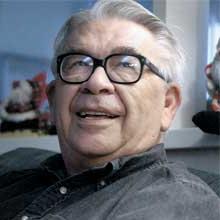A Quote by Norman Lindsay
Every mind which has given itself to self-expression in art is aware of a directing agency outside its conscious control which it has agreed to label 'inspiration'.
Related Quotes
Simply put, meta-writing is writing that is self-conscious, self-reflective, and aware of itself as an artifice. The writer is aware she's writing, and she's aware there's a reader, which goes all the way back to Montaigne's often-used address "dear reader," or his brief introduction to Essais: "To the Reader." It can be done in a myriad of ways.
Instead of 'watching the thinker,' you can also create a gap in the mind stream simply by directing the focus of your attention into the Now. Just become intensely conscious of the present moment. This is a deeply satisfying thing to do. In this way, you draw consciousness away from mind activity and create a gap of no-mind in which you are highly alert and aware but not thinking. This is the essence of meditation.
And when it is suggested that the inward feelings of power or inward monitions or losses of judgement are the germs out of which the divine machinery developed, I return that truth is just the reverse, that the presence of voices which had to be obeyed were the absolute prerequisite to the conscious stage of mind in which it is the self that is responsible and can debate within itself, can order and direct, and that the creation of such a self is the product of culture. In a sense, we have become our own gods.
All thought of something is at the same time self-consciousness [...] At the root of all our experiences and all our reflections, we find [...] a being which immediately recognises itself, [...] and which knows its own existence, not by observation and as a given fact, nor by inference from any idea of itself, but through direct contact with that existence. Self-consciousness is the very being of mind in action.
Embedded in every technology there is a powerful idea, sometimes two or three powerful ideas. Like language itself, a technology predisposes us to favor and value certain perspectives and accomplishments and to subordinate others. Every technology has a philosophy, which is given expression in how the technology makes people use their minds, in how it codifies the world, in which of our senses it amplifies, in which of our emotional and intellectual tendencies it disregards.
All that we can hope from these inspirations, which are the fruits of unconscious work, is to obtain points of departure for such calculations. As for the calculations themselves, they must be made in the second period of conscious work which follows the inspiration, and in which the results of the inspiration are verified and the consequences deduced.?
I AM wealthy, poor, healthy, sick, free, confined were first of all impressions or conditions felt before they became visible expressions. Your world is your consciousness objectified. Waste no time trying to change the outside; change the within or the impression; and the without or expression will take care of itself. When the truth of this statement dawns upon you, you will know that you have found the lost word or the key to every door. I AM (your consciousness) is the magical lost word which was made flesh in the likeness of that which you are conscious of being.
A good author, and one who writes carefully, often discovers that the expression of which he has been in search without being able to discover it, and which he has at last found, is that which was the most simple, the most natural, and which seems as if it ought to have presented itself at once, without effort, to the mind.
In every art we are always obliged to return to the accepted means of expression, the conventional language of the art. What is a black-and-white drawing but a convention to which the beholder has become so accustomed that with his mind's eye he sees a complete equivalent in the translation from nature?
[Raphael's] great superiority is due to the instinctive sense which, in him, seems to desire to shatter form. Form is, in his figures, what it is in ourselves, an interpreter for the communication of ideas and sensations, an exhaustless source of poetic inspiration. Every figure is a world in itself, a portrait of which the original appeared in a sublime vision, in a flood of light, pointed to by an inward voice, laid bare by a divine finger which showed what the sources of expression had been in the whole past life of the subject.







































